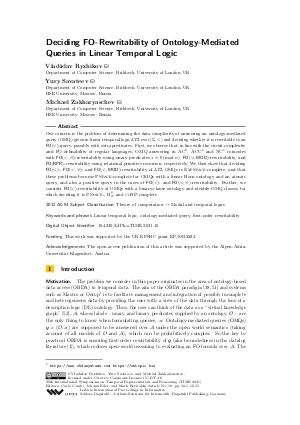@InProceedings{ryzhikov_et_al:LIPIcs.TIME.2021.10,
author = {Ryzhikov, Vladislav and Savateev, Yury and Zakharyaschev, Michael},
title = {{Deciding FO-Rewritability of Ontology-Mediated Queries in Linear Temporal Logic}},
booktitle = {28th International Symposium on Temporal Representation and Reasoning (TIME 2021)},
pages = {10:1--10:15},
series = {Leibniz International Proceedings in Informatics (LIPIcs)},
ISBN = {978-3-95977-206-8},
ISSN = {1868-8969},
year = {2021},
volume = {206},
editor = {Combi, Carlo and Eder, Johann and Reynolds, Mark},
publisher = {Schloss Dagstuhl -- Leibniz-Zentrum f{\"u}r Informatik},
address = {Dagstuhl, Germany},
URL = {https://drops.dagstuhl.de/entities/document/10.4230/LIPIcs.TIME.2021.10},
URN = {urn:nbn:de:0030-drops-147867},
doi = {10.4230/LIPIcs.TIME.2021.10},
annote = {Keywords: Linear temporal logic, ontology-mediated query, first-order rewritability}
}

 Creative Commons Attribution 4.0 International license
Creative Commons Attribution 4.0 International license























